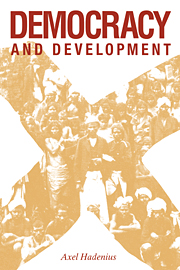Book contents
- Frontmatter
- Contents
- List of tables and figure
- Acknowledgements
- INTRODUCTION
- PART ONE DETERMINING THE LEVEL OF DEMOCRACY
- PART TWO EXPLAINING THE LEVEL OF DEMOCRACY
- 4 Introduction
- 5 Socio-economic conditions
- 6 Demographic and cultural conditions
- 7 Institutional conditions
- 8 General picture and problems of causality
- Appendices
- Notes
- Bibliography
- Index
5 - Socio-economic conditions
Published online by Cambridge University Press: 28 October 2009
- Frontmatter
- Contents
- List of tables and figure
- Acknowledgements
- INTRODUCTION
- PART ONE DETERMINING THE LEVEL OF DEMOCRACY
- PART TWO EXPLAINING THE LEVEL OF DEMOCRACY
- 4 Introduction
- 5 Socio-economic conditions
- 6 Demographic and cultural conditions
- 7 Institutional conditions
- 8 General picture and problems of causality
- Appendices
- Notes
- Bibliography
- Index
Summary
MODERNIZATION
The hitherto greatest (in terms of adherents and research pursued) and most dominant theory of the prerequisites of democracy is the modernization theory (sometimes also called the development theory). It was launched in the late 1950s and had its heyday in the early and mid-1960s. In purely scientific terms, it coincided with the politico-sociological-cum-functionalistic vogue, which was characterized by a strong emphasis on the significance of the value and norm systems for the explanation of political behaviour, and which, with regard to method, often involved quantitative studies, i.e., collection of mass data which are subjected to statistical analysis.
Temporally speaking, it also coincided with a very hopeful period for the spread of democracy: in the years around 1960 a good many colonies in Africa gained their independence with the introduction of democratic forms of government, and several countries in Latin America too then abandoned military government in favour of rule by the people. Democracy seemed generally to be in progress. This state of affairs should to some extent explain the optimistic view which frequently characterized the analyses of the modernization school.
Its basic tenet is that a general economic development – measured in GNP/capita, the degree of industrialization, urbanization, etc. – should bring about an overall transformation of the society which, in turn, gives rise to a political change in democracy's favour. It is expected that a general social mobilization will ensue which Karl Deutsch, one of the leading advocates of the modernization school, defined as ‘the process in which major clusters of old social, economic and psychological commitments are eroded or broken and people become available for new patterns of socialization and behaviour’.
- Type
- Chapter
- Information
- Democracy and Development , pp. 77 - 111Publisher: Cambridge University PressPrint publication year: 1992
- 1
- Cited by



